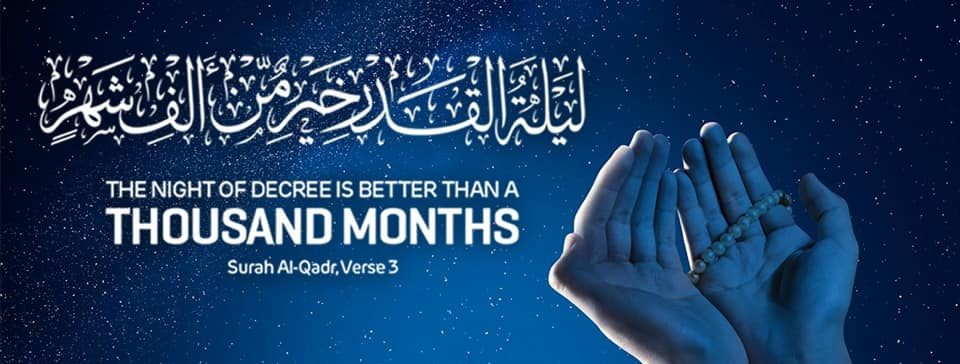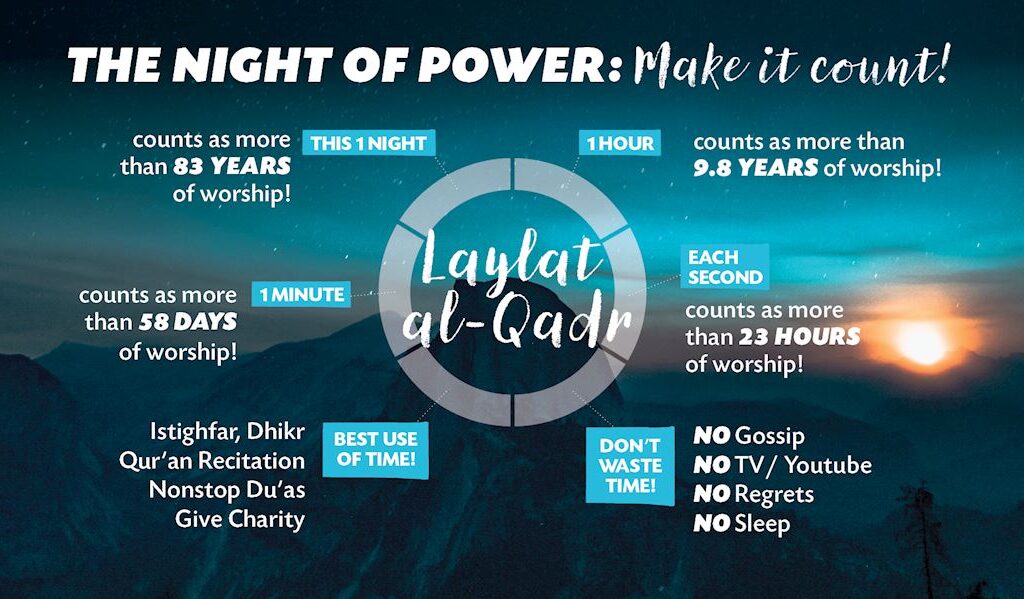Laylatul Qadr, known as the Night of Power, holds a paramount position within the Islamic calendar, revered for its profound spiritual significance. As Ramadan graces us with its presence, we embark on a journey to explore the sanctity of Laylatul Qadr, nestled within the final ten nights of this blessed month, offering believers an unparalleled opportunity to seek divine blessings through virtuous deeds.
Prophet Muhammed (peace be upon him) said:
Search for the Night of Qadr in the odd nights of the last ten days of Ramadan.
Hadith | Sahih al-Bukhari
What is Laylatul Qadr?
Muslims highly revere and consider Laylatul Qadr, often translated as the Night of Power or the Night of Decree, as a significant night in the Islamic faith. It is believed to occur within the last ten nights of the month of Ramadan, although the exact date is not specified in the Islamic scriptures.This night holds immense spiritual importance as it commemorates the night when the Quran, the holy book of Islam, was first revealed to the Prophet Muhammad (peace be upon him) by the Angel Gabriel.
During Laylatul Qadr, the blessings and mercy of Allah are abundant, and prayers and supplications made on this night hold great significance. It is believed to be a time when one’s prayers are more likely to be answered, sins forgiven, and destinies altered. The Quran describes Laylatul Qadr as “better than a thousand months” (Surah Al-Qadr, 97:3), emphasizing its immense value and significance.
Muslims engage in various acts of worship on Laylatul Qadr, including recitation of the Quran, offering voluntary prayers (Tahajjud), making supplications (dua), seeking forgiveness, and engaging in acts of charity and kindness. Many Muslims spend the entire night in worship and contemplation, seeking the blessings and forgiveness of Allah.
Due to the profound spiritual significance of Laylatul Qadr, Muslims around the world eagerly seek out this blessed night, striving to maximize their worship and devotion in the hope of attaining spiritual purification and divine mercy.
Allah SWT says in the Quran:
إِنَّآ أَنزَلْنَـٰهُ فِى لَيْلَةِ ٱلْقَدْرِ ١ وَمَآ أَدْرَىٰكَ مَا لَيْلَةُ ٱلْقَدْرِ ٢ لَيْلَةُ ٱلْقَدْرِ خَيْرٌۭ مِّنْ أَلْفِ شَهْرٍۢ ٣ تَنَزَّلُ ٱلْمَلَـٰٓئِكَةُ وَٱلرُّوحُ فِيهَا بِإِذْنِ رَبِّهِم مِّن كُلِّ أَمْرٍۢ ٤ سَلَـٰمٌ هِىَ حَتَّىٰ مَطْلَعِ ٱلْفَجْرِ ٥
Qur’an | 97:1-5

When is Laylatul Qadr?
Scholars of Hadith advise focusing on the last ten nights of Ramadan, particularly the odd nights, to search for Laylatul Qadr.
Prophet Muhammad (peace be upon him) advised: “Look for it in the odd nights of the last ten nights of the month of Ramadan.” (Recorded in Bukhari and Muslim)
This Hadith underscores the importance of seeking Laylatul Qadr during the last ten nights of Ramadan, with emphasis on the odd nights. While humankind remains unaware of the exact date of Laylatul Qadr, it is highly probable that it falls on one of these odd nights. This recommendation encourages Muslims to intensify their worship, supplication, and reflection during this period, striving to attain the blessings and mercy of Allah. Ultimately, the knowledge of Laylatul Qadr rests with Allah alone.
Why is Laylatul Qadr called the Night of Power?
Laylatul Qadr is called the Night of Power to highlight the immense significance and power associated with this blessed night in the Islamic faith. It is believed to be a night filled with divine blessings, mercy, and forgiveness, where the destiny of individuals and communities is determined. The term “Power” in the name emphasizes the profound impact and transformative potential of this night on the spiritual lives of believers. It signifies the unparalleled potency of worship, supplication, and devotion performed on this night, as well as the magnitude of Allah’s mercy and grace bestowed upon His servants. The designation of Laylatul Qadr as the Night of Power underscores its unparalleled importance and serves as a reminder for Muslims to seek its blessings fervently and engage in acts of worship with utmost sincerity and devotion.
Allah says about the purpose of this night:
حمٓ ١ وَٱلْكِتَـٰبِ ٱلْمُبِينِ ٢ إِنَّآ أَنزَلْنَـٰهُ فِى لَيْلَةٍۢ مُّبَـٰرَكَةٍ ۚ إِنَّا كُنَّا مُنذِرِينَ ٣ فِيهَا يُفْرَقُ كُلُّ أَمْرٍ حَكِيمٍ ٤ أَمْرًۭا مِّنْ عِندِنَآ ۚ إِنَّا كُنَّا مُرْسِلِينَ ٥
Qur’an | 44:1-5
Signs of Laylatul Qadr
To recognize Laylatul Qadr, Muslims observe specific signs, acknowledging only Allah knows its exact timing. Among the most authentic signs of Laylatul Qadr are:
- The sun rises early in the morning without rays: Ubayy ibn Ka’b (may Allah be pleased with him) reported that the Prophet Muhammad (peace be upon him) said, “On the morning following Laylatul-Qadr, the sun rises without any rays, as if it were a brass dish, until it rises up.” (Hadith recorded in Sahih Muslim)
- It is a pleasant and calm night: Ibn Abbas (may Allah be pleased with him) narrated that the Prophet Muhammad (peace be upon him) said, “Laylatul-Qadr is calm and pleasant, neither hot nor cold, the sun rises on its morning being feeble and red.” (Hadith recorded in Ibn Khuzaimah)
These signs serve as indicators for Muslims to increase their devotion and worship during the last ten nights of Ramadan, particularly seeking Laylatul Qadr. By earnestly praying and making supplications, believers strive to earn the immense rewards associated with this special night. It is through dedication to worship and spiritual mindfulness that one may have the opportunity to witness and benefit from the blessings of Laylatul Qadr. Therefore, Muslims are encouraged to seize the opportunity presented by Ramadan and intensify their acts of worship in anticipation of Laylatul Qadr, seeking Allah’s mercy and forgiveness.
Understanding the Duration of Laylatul Qadr: From Sunset to Dawn
The Night of Power, or Laylatul Qadr, extends from Maghrib (sunset) to Fajr (dawn) time in the Islamic calendar. This means that it encompasses the time between the Maghrib prayer, which marks the beginning of a new Islamic day, and the Fajr prayer, which is performed before sunrise. It is during this period, particularly in the last third of the night, that Allah (SWT) descends to the lowest heavens, according to Islamic belief. Muslims are encouraged to engage in acts of worship, such as Tahajjud prayers and supplications (Du’a), during this sacred time to seek the blessings and mercy of Allah. Therefore, the Night of Power spans the duration from sunset to dawn, providing believers with a significant opportunity to earn rewards through devotion and spiritual reflection.
Observing the Night of Power
The Night of Power, or Laylat al-Qadr, holds immense significance in Islam as it marks the night when the Quran was first revealed to the Prophet Muhammad (peace be upon him). Muslims around the world eagerly anticipate this blessed night, seeking its virtues and blessings through various acts of worship.
In Islam, believers highly encourage observing the Night of Power and engage in extra acts of worship to seek its rewards. These acts include giving Zakat (mandatory alms giving based on wealth), Sadaqah (voluntary charity), performing Nafl prayers (voluntary prayers), and making Du’a (supplications) with sincerity and devotion.
Communities often come together during the last ten nights of Ramadan, the month in which Laylat al-Qadr falls, to intensify their worship and seek the blessings of this special night. Mosques may host special prayers or fundraising events for charitable causes, fostering a sense of communal unity and devotion.
However, the observance of Laylat al-Qadr is not limited to congregational gatherings. Muslims may also observe it individually, either at home in solitude, in Itikaf (devotion to worship inside a mosque for the last ten nights of Ramadan), or by visiting a mosque for special prayers.
It’s important to note that there is no prescribed or fixed way to observe the Night of Power. Muslims are encouraged to seek it with sincerity, humility, and devotion, engaging in acts of worship that resonate with their spiritual inclinations and circumstances. The essence lies in striving for closeness to Allah and seeking His mercy and forgiveness on this blessed night.
The Religious Significance of Laylatul Qadr
Commemorating the Revelation of the Qur’an
The Night of Power holds immense significance in the Islamic faith as it marks the pivotal event of the revelation of the Quran to the Prophet Muhammad (peace be upon him). This momentous occasion, which occurred during the month of Ramadan in the year 610 CE, initiated the Prophethood of Muhammad and introduced the divine message of Islam to humanity for all time to come.
Because of its profound importance, Muslims worldwide are encouraged to earnestly seek out this blessed night throughout the month of Ramadan. Believers engage in increased acts of worship, such as extra prayers, recitation of the Quran, supplications, and charitable deeds, with the hope of attaining the abundant rewards promised by Allah on the Night of Power.
During this period of devotion, Muslims reflect on Quranic revelation and Islamic teachings. Additionally, it reminds us of Allah’s guidance through His final revelation and its profound impact on human history.
Essentially, the Night of Power is a time for deep spiritual reflection and devotion for Muslims, seeking closeness to Allah.
Enroll Now: Quran Course

Observances on Laylatul Qadr
A Night of Spiritual Eminence
On Laylatul Qadr, Muslims participate in various acts of worship to seek immense blessings and rewards.
- Muslims are encouraged to remember Allah more by reciting tasbih, seeking forgiveness, and praising Him.
- Performing extra rakat of prayers, especially during the night, is highly recommended. The rewards for praying on Laylatul Qadr are multiplied manifold, with even a small act of worship carrying immense significance.
- Du’a (Supplication): Laylatul Qadr is an opportune time to turn to Allah with sincere supplications from the heart. Muslims seek forgiveness for their sins, ask for guidance, and make requests for their needs and desires.
- Reflection and Repentance: This blessed night provides a chance for introspection and reflection on one’s actions and behavior. Muslims seek forgiveness for past sins and commit to self-improvement, avoiding sinful behavior in the future.
- Sadaqah (Charity): Giving charity, especially during Ramadan and on Laylatul Qadr, holds great virtue in Islam. Muslims give sadaqah, including money, food, or assistance, to aid those in need.
Prayer Guidelines for Laylatul Qadr
To pray on Laylatul Qadr, Muslims should emulate Prophet Muhammad (peace be upon him) and worship sincerely.
- Engaging in voluntary prayers: Muslims can perform extra rakat, like Tahajjud or Qiyam ul-Layl, on Laylatul Qadr night. These prayers should be performed with humility and focus, seeking closeness to Allah and His mercy.
- Recitation of the Quran: Muslims are encouraged to recite and reflect upon the Quran during Laylatul Qadr. Reading and pondering over the verses of the Quran can deepen one’s connection with Allah and increase spiritual enlightenment.
- Making Du’a (Supplication): Laylatul Qadr is an opportune time to pour out one’s heart in sincere supplication to Allah. Muslims should make du’a for themselves, their loved ones, the oppressed, humanity at large, and all of Allah’s creatures. Pray for Muslims worldwide: well-being, guidance, relief, ease, patience, and fulfillment of needs.
- Seeking Forgiveness: Laylatul Qadr is a night of forgiveness and mercy. Muslims should seek forgiveness for their sins with sincerity and repentance, acknowledging their shortcomings and striving to improve their conduct.
- Engaging in Dhikr: Remembrance of Allah through dhikr (glorification and praise of Allah) is highly recommended on Laylatul Qadr. Muslims can repeat phrases like “Glory be to Allah,” “Praise be to Allah,” and “Allah is the Greatest.”
Learn more about What to Do on Laylatul Qadr
The Excellence of Laylatul Qadr
A Night of Incomparable Rewards
The Night of Power, or Laylatul Qadr, holds a special status among Muslims for its unparalleled rewards. Muslims consider this blessed night the best time for worship for several compelling reasons:
1. Magnitude of Rewards: The rewards for any righteous deed performed on Laylatul Qadr are incomparable. In Islamic tradition, an act of worship on this night equals 83 years of daily deeds. Such immense rewards highlight the significance and virtue of Laylatul Qadr.
2. Multiplication of Deeds: On Laylatul Qadr, the value of good deeds is multiplied manifold. Every prayer, supplication, and act of devotion performed during this blessed night carries immense weight in the eyes of Allah. Muslims seize this opportunity to maximize their worship and earn abundant blessings and rewards.
3. Divine Blessings and Mercy: Laylatul Qadr is a night when the gates of divine mercy are wide open. Believers worshipping and supplicating receive forgiveness, mercy, and blessings. It is a time when Allah’s grace descends abundantly upon those who seek His favor with sincerity and humility.
4. Spiritual Elevation: Engaging in worship on Laylatul Qadr facilitates spiritual elevation and growth. The profound connection established with the divine during this blessed night strengthens faith, purifies the heart, and nourishes the soul. Believers emerge from Laylatul Qadr rejuvenated in their devotion and closer to attaining spiritual fulfillment.
5. Opportunity for Redemption: Laylatul Qadr offers a golden opportunity for believers to seek redemption and renewal. Through repentance, supplication, and worship, Muslims seek forgiveness and spiritual growth.
What are the rewards of Laylatul Qadr?
Whoever prays on Laylatul Qadr out of faith and sincerity, shall have all their past sins forgiven.
Hadith | Bukhari and Muslim
Our Prophet (peace be upon him) urged us to maximize the holy night’s benefit and not overlook its importance. The best deeds for reaping rewards on the holy night include fasting, praying, seeking repentance, and giving Sadaqah.
The rewards of Laylatul Qadr are indeed immense, as emphasized in the Holy Qur’an by Allah, the Most Merciful. In Surah Al-Qadr (97:1-5), Allah describes this sacred night:
“Indeed, We sent the Qur’an down during the Night of Decree. And what can make you know what is the Night of Decree? The Night of Decree is better than a thousand months. The angels and the Spirit descend therein by permission of their Lord for every matter. Peace it is until the emergence of dawn.”
Performing acts of worship such as Nafl (voluntary) prayers, Sadaqah (charity), and Du’a (supplication) can earn believers bountiful rewards. Performing these acts with sincere intention on the Night of Power can yield exceptional rewards.
In essence, Laylatul Qadr offers believers a unique opportunity to multiply their deeds and draw closer to Allah (SWT). Believers can seek divine favor, mercy, and blessings through sincere devotion on this blessed night.
What to Do on Laylatul Qadr
1-Salah and Voluntary Salah:
Ensuring we pray all compulsory prayers in their correct times is paramount, with Salah being a pillar of Islam. Laylatul Qadr prompts reflection on our Salah and encourages improvement. Additionally, praying voluntary (nafl) prayers on this night yields immense rewards, with just two rakat equating to 83 years of Salah!
2-Recitation of the Quran on Laylatul Qadr:
Dedicate time to reciting and contemplating the Quran on Laylatul Qadr, as it is a night when the Quran was revealed.
3-Making Du’a:
Turn to Allah (SWT) sincerely on this blessed night, making heartfelt Du’a not only for oneself but also for loved ones, the oppressed, humanity, and all of Allah (SWT)’s creation. Remember to pray especially for our Muslim brothers and sisters worldwide facing difficulties, asking Allah (SWT) to grant them ease, patience, and fulfillment of their needs.
4-Tawbah (Repentance) for Major and Minor Sins:
Laylatul Qadr is a time when Allah Almighty extends His Mercy to those sincerely seeking forgiveness. Reflect on our sins, seek forgiveness from Allah (SWT), and resolve to improve our conduct, refraining from returning to sinful behavior.
5-Acts of Sadaqah and Sadaqah Jariyah:
Giving Sadaqah to those in need, particularly during Laylatul Qadr, holds immense virtue. The Prophet (PBUH) emphasized Sadaqah in Ramadan as the best charity. With rewards multiplied on this night, giving Sadaqah becomes even more beneficial. Remember to extend help to those affected by disasters such as the Syria and Turkey earthquake and the Pakistan floods.
6-Qiyam ul-Layl (Night Vigil) on Laylatul Qadr:
Engage in Qiyam ul-Layl, the night vigil, on Laylatul Qadr to draw closer to Allah and earn His pleasure and blessings.
7-Upright Conduct and Character Towards Others:
Good character and manners are integral to our faith. Strive for qualities like generosity, kindness, and humility while combating negative traits such as greed, jealousy, and hatred. Upholding upright conduct towards others is crucial, particularly on Laylatul Qadr, as we seek to emulate the noble character of the Prophet Muhammad (PBUH).

